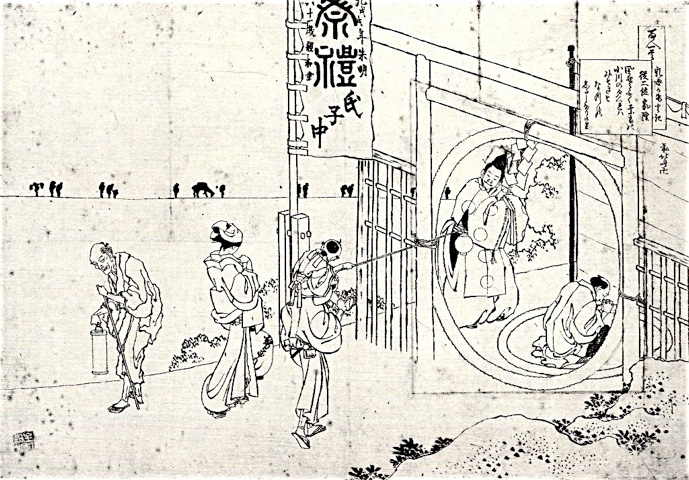従二位家隆


風そよぐ
ならの小川の
夕ぐれは
みそぎぞ夏の
しるしなりける
Hokusai
じゅにいいえたか
かぜそよぐ
ならのおがわの
ゆうぐれは
みそぎぞなつの
しるしなりける
Fujiwara no Ietaka
A breeze rustles
Over Nara brook
As the evening falls
The only sign of summer
Here are the ablutions.
Fujiwara no Ietaka (1158 - 1237), also called Junii Fujiwara no Ietaka or Karyu, nickname Mibu Nihon, came from an influential aristocratic family and was by marriage related to Jakuren (poem 87). He studied poetry under Toshinari (poem 83). His personal poetry collection is called the Gyokuginshu or Minishu. He was one of the compilers of the Shin Kokinshu. There are 282 poems by him in imperial anthologies.
This poem refers to a poem in the Shin Kokinshu (1376):
みそぎするならのおがはの河風にいのりぞわたるしたにたえじと
They practice lustration
at Nara Brook
in the river breeze,
but I pray for further protection
to keep my love alive.
But there is a closer resemblance to this poem by Minamoto no Yoritsuna in the Goshuishu (231):
夏山の楢の葉そよぐ夕ぐれはことしも秋の心地こそすれ
In the summer hills
when the leaves of the oaks rustle
in the evening,
this year too, one has indeed
the sensation of autumn.
Misogi means lustration, a ritual purification ceremony performed in summer, to be cleansed from sins like illicit love affairs. Nara in Ietaka’s poem is part of a placename, but also means ‘oak’. Nara river is a very small river, a brook, and runs through the premises of the Kamigamo shrine in Kyoto, where the ceremony is still performed.
It is uncanny, but when I first looked at the above drawing by Hokusai, it occurred to me that this old man on the left looking and smiling at us, could be a a self-portrait of the artist. And indeed, that is the general consensus. While a young couple with a child is walking toward the temple, the old man is returning with his lantern in hand and is smiling at us. If this drawing had been executed as a woodcut it would have been a magnificent evening scene about people going to the lustration ceremony.
The hoop made of reeds under the torii is to be passed three times to provide protection against misfortune and disease, then you purify yourself by washing your hands and mouth with the shrine water.


